
Oscar Fingal O'Fflahertie Wills Wilde was an Irish poet and playwright. After writing in different forms throughout the 1880s, he became one of the most popular playwrights in London in the early 1890s. He is best remembered for his epigrams and plays, his novel The Picture of Dorian Gray, and his criminal conviction for gross indecency for homosexual acts.

John Sholto Douglas, 9th Marquess of Queensberry, was a British nobleman of the Victorian era, remembered for his atheism, his outspoken views, his brutish manner, for lending his name to the "Queensberry Rules" that form the basis of modern boxing, and for his role in the downfall of the Irish author and playwright Oscar Wilde.

Lord Alfred Bruce Douglas, also known as Bosie Douglas, was an English poet and journalist, and a lover of Oscar Wilde. At Oxford he edited an undergraduate journal, The Spirit Lamp, that carried a homoerotic subtext, and met Wilde, starting a close but stormy relationship. Douglas's father, the Marquess of Queensberry, abhorred it and set out to humiliate Wilde, publicly accusing him of homosexuality. Wilde sued him for criminal libel, but some intimate notes were found and Wilde was later imprisoned. On his release, he briefly lived with Douglas in Naples, but they had separated by the time Wilde died in 1900. Douglas married a poet, Olive Custance, in 1902 and had a son, Raymond.
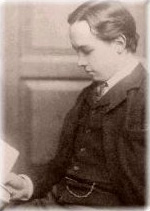
Robert Baldwin Ross was a British journalist, art critic and art dealer, best known for his relationship with Oscar Wilde, to whom he was a devoted friend and literary executor. A grandson of the Canadian reform leader Robert Baldwin, and son of John Ross and Augusta Elizabeth Baldwin, Ross was a pivotal figure on the London literary and artistic scene from the mid-1890s to his early death, and mentored several literary figures, including Siegfried Sassoon. His open homosexuality, in a period when male homosexual acts were illegal, brought him many hardships.
This article contains information about the literary events and publications of 1895.
Events from the year 1895 in Ireland.

The Trials of Oscar Wilde, also known as The Man with the Green Carnation and The Green Carnation, is a 1960 British drama film based on the libel and subsequent criminal cases involving Oscar Wilde and the Marquess of Queensberry. It was written by Allen and Ken Hughes, directed by Hughes, and co-produced by Irving Allen, Albert R. Broccoli and Harold Huth. The screenplay was by Ken Hughes and Montgomery Hyde, based on an unperformed play The Stringed Lute by John Furnell. The film was made by Warwick Films and released by Eros Films.

Oscar Wilde is a 1960 biographical film about Oscar Wilde, made by Vantage Films and released by 20th Century Fox. The film was directed by Gregory Ratoff and produced by William Kirby, from a screenplay by Jo Eisinger, based on the play Oscar Wilde by Leslie Stokes and Sewell Stokes. The film starred Robert Morley, Ralph Richardson, Phyllis Calvert and Alexander Knox.

Christopher Merlin Vyvyan Holland is a British biographer and editor. He is the only grandchild of Oscar Wilde, whose life he has researched and written about extensively.

Albemarle Street is a street in Mayfair in central London, off Piccadilly. It has historic associations with Lord Byron, whose publisher John Murray was based here, and Oscar Wilde, a member of the Albemarle Club, where an insult he received led to his suing for libel and to his eventual imprisonment. It is also known for its art galleries and the Brown's Hotel is located at 33 Albemarle Street.
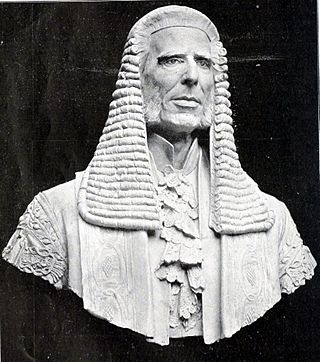
Richard Henn Collins, Baron Collins was an Anglo-Irish lawyer and judge.
Nationality words link to articles with information on the nation's poetry or literature.
Gross Indecency: The Three Trials of Oscar Wilde is a 1997 play written and directed by Moisés Kaufman. It deals with Oscar Wilde's three trials on the matter of his relationship with Lord Alfred Douglas and other men.
Events from the year 1895 in the United Kingdom.
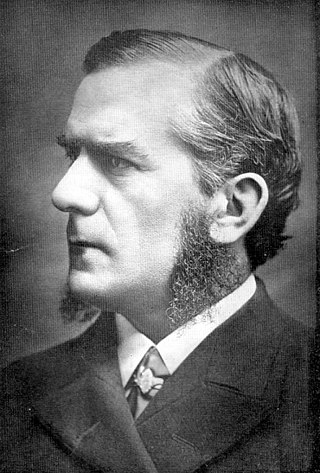
Sir Edward George Clarke, KC was a British barrister and politician, considered one of the leading advocates of the late Victorian era and serving as Solicitor-General in the Conservative government of 1886–1892. His legal career included representing Oscar Wilde in his disastrous prosecution of the Marquess of Queensberry for libel, and representing the plaintiff in the "baccarat case", during which Sir Edward cross-examined the Prince of Wales. He was a member of the anti-women's suffrage movement.

The Hotel Café Royal is a five-star hotel at 68 Regent Street in Piccadilly, London. Before its conversion in 2008–2012 it was a restaurant and meeting place known as the Café Royal.
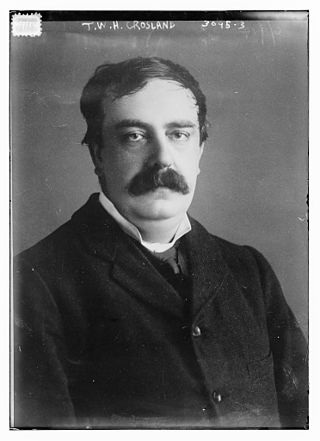
Thomas William Hodgson Crosland was a British author, poet and journalist.
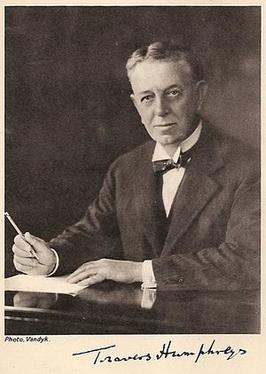
Sir Richard Somers Travers Christmas Humphreys was a noted British barrister and judge who, during a sixty-year legal career, was involved in the cases of Oscar Wilde and the murderers Hawley Harvey Crippen, George Joseph Smith and John George Haigh, the 'Acid Bath Murderer', among many others.

Herbert Vivian was an English journalist, author and newspaper owner, who befriended Lord Randolph Churchill, Charles Russell, Leopold Maxse and others in the 1880s. He campaigned for Irish Home Rule and was private secretary to Wilfrid Blunt, poet and writer, who stood in the 1888 Deptford by-election. Vivian's writings caused a rift between Oscar Wilde and James NcNeil Whistler. In the 1890s, Vivian was a leader of the Neo-Jacobite Revival, a monarchist movement keen to restore a Stuart to the British throne and replace the parliamentary system. Before the First World War he was friends with Winston Churchill and was the first journalist to interview him. Vivian lost as Liberal candidate for Deptford in 1906. As an extreme monarchist throughout his life, he became in the 1920s a supporter of fascism. His several books included the novel The Green Bay Tree with William Henry Wilkins. He was a noted Serbophile; his writings on the Balkans remain influential.
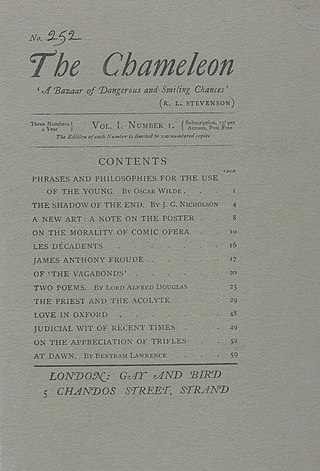
The Chameleon was a literary magazine edited by Oxford undergraduate John Francis Bloxam. Its first and only issue was published in December 1894. It featured several literary works from the Uranian tradition, concerning the love of adolescent boys.
![The Marquess of Queensberry's calling card with the handwritten offending inscription "For Oscar Wilde posing Somdomite [sic]". The card was marked as exhibit 'A' in Wilde's libel action. Somdomite.jpg](http://upload.wikimedia.org/wikipedia/commons/thumb/8/82/Somdomite.jpg/220px-Somdomite.jpg)














